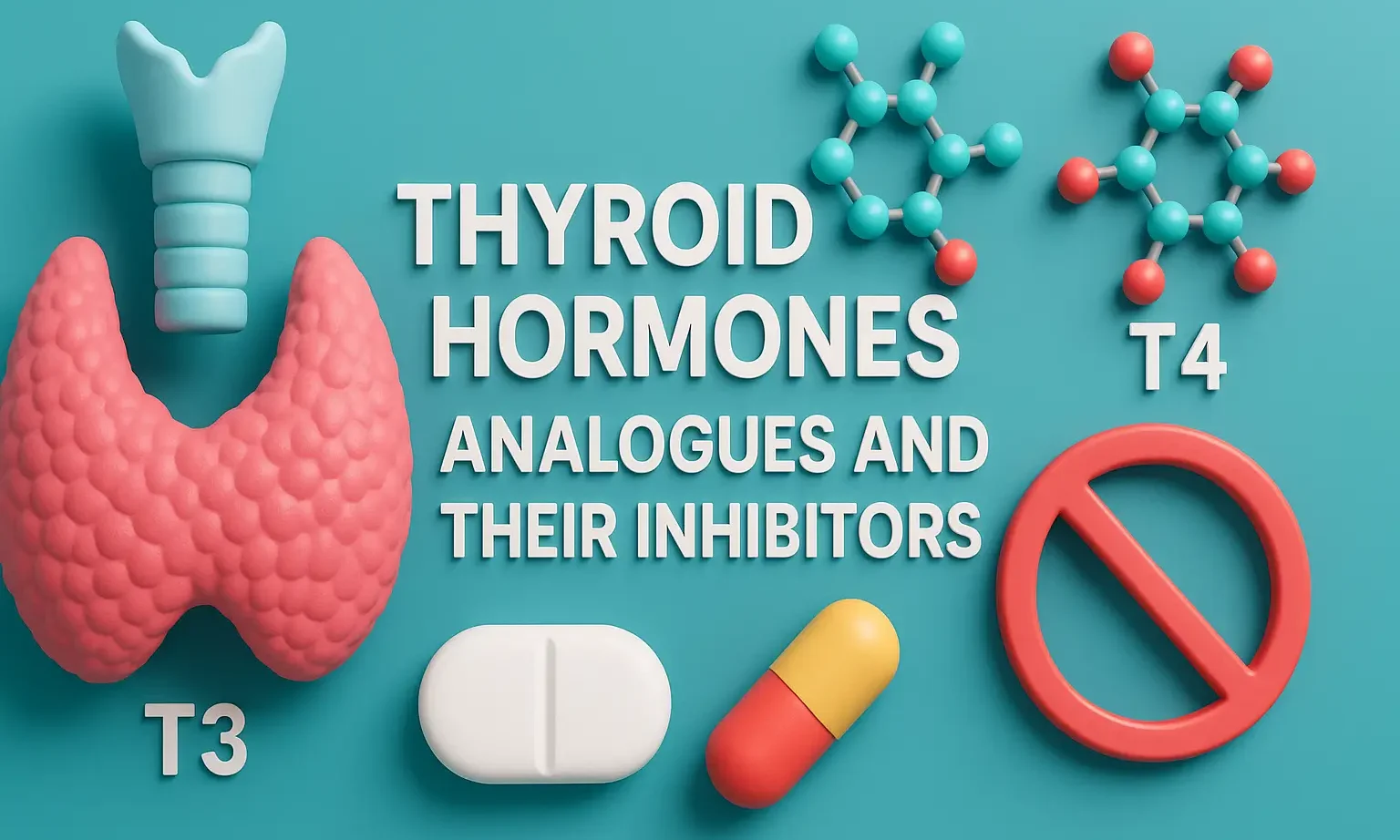- Thyroid Hormones: Analogues and Their Inhibitors include levothyroxine, liothyronine, and antithyroid drugs.
- Thyroid Hormones: Analogues and Their Inhibitors regulate metabolism and treat thyroid disorders.
- Thyroid hormones play a crucial role in metabolism, growth, and development.
- Pharmacological manipulation of these hormones is essential in treating various thyroid disorders.
Thyroid Hormones: T3 (Triiodothyronine) and T4 (Thyroxine)
Synthesis:
- Iodide uptake by thyroid follicular cells.
- Iodination of tyrosine residues on thyroglobulin (organification).
- Coupling of iodotyrosines (MIT & DIT) to form T3 and T4.
- Proteolysis of thyroglobulin to release T3 and T4 into circulation.
Advertisements
Regulation:
- TSH from the pituitary stimulates thyroid hormone synthesis.
- Negative feedback by circulating T3/T4 regulates secretion.
Thyroid Hormone Analogues

Advertisements
-
Levothyroxine (Synthetic T4):
- Uses: Primary treatment for hypothyroidism.
- Mechanism: Replaces deficient T4, converted to active T3 in peripheral tissues.
- Adverse Effects: Symptoms of hyperthyroidism if overdosed (e.g., tachycardia, weight loss).
-
Liothyronine (Synthetic T3):
- Uses: Rapid thyroid hormone action (e.g., myxedema coma).
- Adverse Effects: Higher risk of cardiac side effects.
-
Desiccated Thyroid Extracts:
- Uses: Contains both T4 and T3, less commonly used.
Thyroid Hormone Inhibitors

Advertisements
-
Thionamides:
- Methimazole and Propylthiouracil (PTU):
- Uses: First-line treatments for hyperthyroidism (e.g., Graves’ disease).
- Mechanism: Inhibit thyroid peroxidase, blocking iodine incorporation and coupling. PTU also inhibits peripheral T4 to T3 conversion.
- Adverse Effects: Rash, agranulocytosis, hepatotoxicity (rare).
-
Iodine Solutions (Potassium Iodide):
- Uses: Acute hyperthyroidism management (e.g., thyroid storm) and pre-surgical preparation.
- Mechanism: Temporarily inhibits hormone release and synthesis (Wolff–Chaikoff effect).
- Adverse Effects: Hypersensitivity, metallic taste, salivary gland swelling.
-
Radioactive Iodine (I-131):
- Uses: Definitive hyperthyroidism treatment by destroying thyroid tissue.
- Adverse Effects: Hypothyroidism post-treatment, radiation thyroiditis.
-
Beta-Blockers (e.g., Propranolol):
- Uses: Symptomatic control (e.g., tachycardia, tremor) and blocks peripheral T4 to T3 conversion.
- Adverse Effects: Bradycardia, fatigue.
Clinical Applications
- Hypothyroidism: Treated with levothyroxine or liothyronine to restore normal function.
- Hyperthyroidism: Managed with thionamides, iodine solutions, radioactive iodine, or beta-blockers.
- Thyroid Cancer: Treated with thyroid hormone analogues to suppress TSH or radioactive iodine for ablation.
Side Effects Overview
- Thionamides: Agranulocytosis, hepatotoxicity, teratogenicity (methimazole).
- Levothyroxine: Hyperthyroidism symptoms if overdosed (e.g., palpitations, anxiety).
- Radioactive Iodine: Hypothyroidism post-treatment, radiation thyroiditis.
Advertisements

